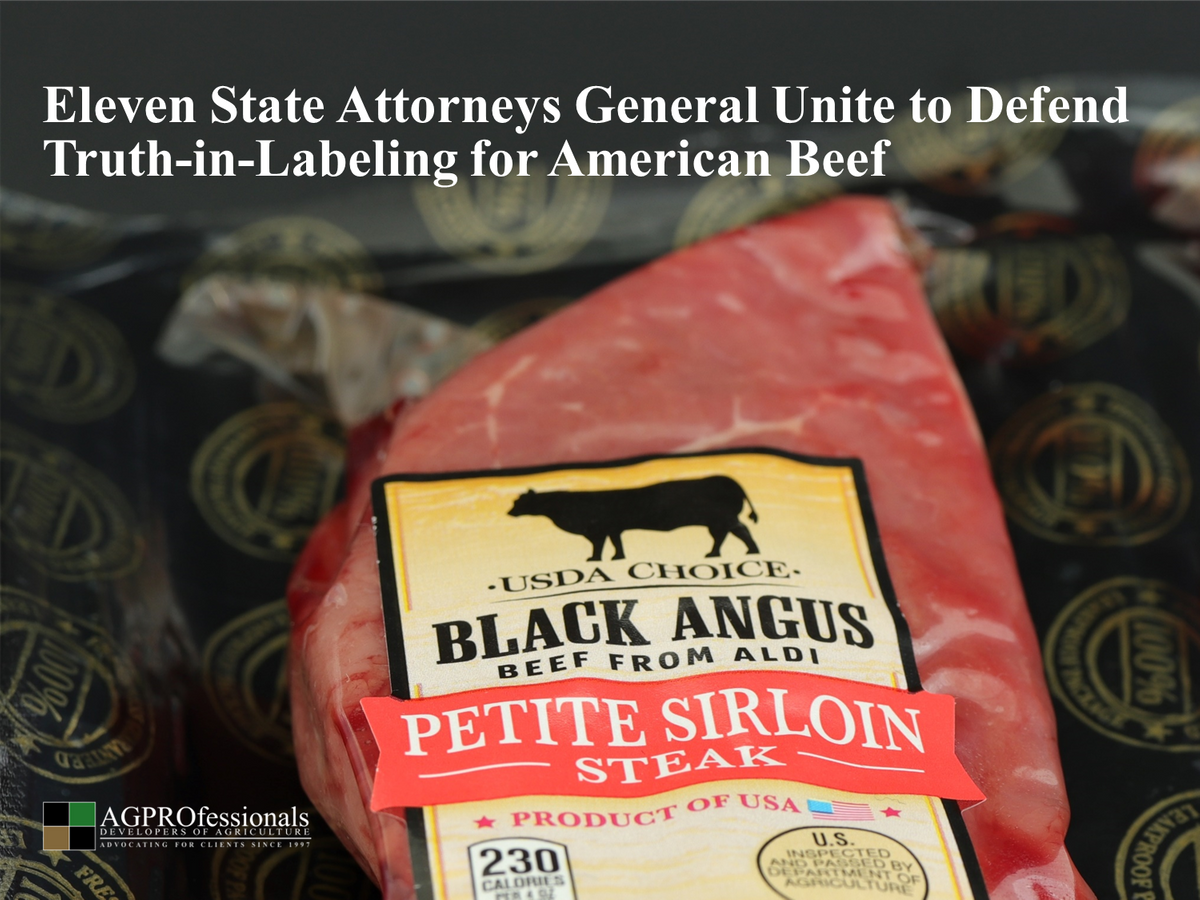A Landmark Coalition for American Beef
A bipartisan coalition of 11 state attorneys general, led by South Dakota Attorney General Marty Jackley, has filed an amicus curiae brief in the U.S. Court of Appeals for the Eighth Circuit. This coalition seeks to uphold a lower court ruling that challenges labeling foreign beef as “Product of USA.”
This fight is about far more than a single label. It is about truth in commerce, constitutional state powers, and defending the economic rights of American beef producers.
The Case at the Core
The lawsuit, brought by South Dakota ranchers, challenges the long-standing USDA policy that allowed processors to use the “Product of USA” label on beef processed or packaged in the United States, even if the cattle were born, raised, and slaughtered in other countries. The Federal Meat Inspection Act (FMIA) explicitly prohibits false or misleading labeling. USDA’s own 2022 consumer research shows that 84% of Americans believe “Product of USA” means the animal was born, raised, slaughtered, and processed in the United States. This consumer expectation calls into question the current practice that allows processors to label beef raised and slaughtered abroad as “Product of USA.”
In January 2025, the U.S. District Court for South Dakota denied the defendants’ motion to dismiss the case, allowing it to proceed. The defendants immediately appealed, bringing the issue to the Eighth Circuit Court of Appeals, where it now sits.
The Latest Development: Case Heads to Appeals Court
As of August 2025, the Eighth Circuit will decide whether the South Dakota ranchers’ claims can move forward. The defendants argue that federal law preempts state law and that their labeling practices were sanctioned by USDA approval. But the South Dakota ranchers, backed by the coalition of 11 states’ attorneys general, contend that USDA’s informal “policy book” and agency comments cannot override statutory truth-in-labeling standards written into the FMIA.
States’ Constitutional Authority and Concurrent Jurisdiction
At the heart of the amicus brief is a constitutional principle: states have concurrent jurisdiction with the federal government under the FMIA to prevent the sale of misbranded meat products.
Section 678 of the FMIA allows states to enforce identical truth-in-labeling standards, ensuring that federal approval of a misleading label does not override a state’s ability to protect its citizens.
The attorneys general argue that:
- USDA’s “policy book” and informal comments are not law, carry no binding authority, and conflict with FMIA statutory definitions.
- Federal agencies cannot “rubber-stamp” a practice that harms American producers and consumers, especially when such actions undermine state police powers.
- Preserving state enforcement authority safeguards local economies and maintains the integrity of domestic beef in interstate and international trade.
Economic & Trade Implications for U.S. Producers
According to the South Dakota ranchers who filed the lawsuit, the use of “Product of USA” labeling on animals that were not born, raised, slaughtered and process in the USA, harms American cattlemen in several ways:
• Market Erosion: Foreign beef presented as domestic dilutes the premium value of genuine U.S. beef. In the global trade arena, label integrity is crucial. Many foreign markets pay extra for U.S.-origin beef.
• Unfair Competition: Multinational processors gain an artificial advantage by blending cheaper imports with domestic beef while selling at premium prices. Allowing misleading labels risks trade disputes and weakens America’s negotiating position in agricultural exports.
• Consumer Trust Damage: Mislabeling undermines confidence in American agricultural brands, which can impact both domestic and export markets.
The USDA’s Upcoming Change
In response to public pressure and lawsuits, the USDA has issued a Final Rule, effective January 2026, requiring that “Product of USA” may only be used if the animal was born, raised, slaughtered, and processed in the United States. However, this current lawsuit is about enforcing truth in labeling now. According to the South Dakota ranchers, without enforcement, these practices will continue to disadvantage American producers until the new rule takes effect.
Why This Is About More Than Beef
While beef labeling is the focus of this lawsuit, the broader implications extend to all agricultural commodities, state sovereignty, and consumer rights. We are seeing additional labeling issues play out when it comes to plant-based and lab-grown food items made to imitate real meat and dairy products. As a reference, we published an article last week about the DAIRY PRIDE Act, which protects the labeling of real dairy products. We have also written articles about actions taken by certain states to regulate and even prevent the sale of imitation food items generated in laboratories. The U.S. Court of Appeals for the Eighth Circuit has previously decided a labeling lawsuit in March of 202, concluding that the State of Missouri is not barred from enforcing its 2018 state law that makes it a crime for vegan food producers to imply that their products contain real meat.
Standing United for American Agriculture
The coalition of attorneys general from South Dakota, Nebraska, Idaho, North Dakota, Colorado, New Mexico, Texas, Montana, Kansas, Oklahoma, and Wyoming have sent a clear message that states will not be sidelined when it comes to protecting their agricultural producers and ensuring truth in the marketplace. If federal agencies can approve misleading labels without challenge, states lose a vital check on corporate misconduct and the ability to defend and protect their own industries. This case reinforces:
• Constitutional balance between state and federal authority
• Property rights of producers in the value of their origin-based branding
• Fair trade principles that demand honesty in labeling
Links:
KLKNtv news story HERE
Brief of Mici Curiae HERE
Downloadable document of Amicus Brief HERE
KXLG Radio article HERE
MeatingPlace article HERE
DTN article HERE
McCarville Report article HERE
AGDaily article HERE
Daily Intake article by Keller and Heckman HERE
U.S. Court of Appeals Eighth Circuit Decision by Courthouse News HERE

